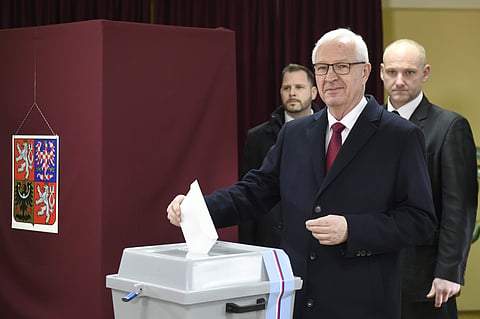

PRAGUE: Czechs returned to the polls Saturday for a second day of voting in a presidential run-off pitting pro-Russian incumbent Milos Zeman against liberal pro-European rival Jiri Drahos that promises to go down to the wire.
The election has polarised Czech society, particularly around the issues of immigration and the foreign policy orientation of this former communist NATO and EU member state.
Bookmakers have given veteran populist Zeman the edge, but recent polls have shown the two candidates neck and neck. About 10 percent of voters remained undecided but polls show they too are split down the middle.
"This is a showdown between two completely different candidates representing two parts of a rather split society," political analyst Tomas Lebeda told AFP.
Known for his pro-Chinese and anti-Muslim stance, the populist Zeman took pole position in a field of nine candidates in the January 12-13 first round vote, garnering 38.56 percent of the ballot. Drahos, a former head of the Czech Academy of Sciences (CAS) and a newcomer to politics, scored 26.60 percent.
A seasoned politician, Zeman represents poorer and rural voters with lower education, while political newcomer Drahos appeals to wealthier, well-educated urbanites.
East vs West
Drahos underscored his concerns about possible Russian meddling in the campaign, saying that "for (Russian President) Vladimir Putin's regime, NATO is the biggest enemy and we are part of NATO."
Zeman meanwhile has called on the EU to lift its sanctions on Russia over its 2014 takeover of Crimea from Ukraine.
Voter Daniel Hajek said he would choose Zeman "because he's opening the door to economic cooperation with countries like Russia and China.
"It's important for us, for jobs; our country is at the heart of Europe -- we can't go in just one direction," he told AFP in Prague.
Europe's fifth biggest carmaker is dependent on auto exports, mainly to the eurozone, and its economy is expected to expand by 3.4 percent this year.
The run-off vote comes amid a wider political crisis as billionaire populist Prime Minister Andrej Babis is fighting police charges of EU subsidy fraud that are hampering his ability to form a government.
Smear campaign?
Zeman's stance on the European Union echoes other populist EU politicians at odds with Brussels over mandatory refugee quotas and various rules which they see as attempts to limit national sovereignty.
Even though the country of 10.6 million people has only received 12 migrants under the EU quota system, migration was a key campaign issue.
Zeman once called the 2015 migrant crisis "an organised invasion" of Europe, claiming Muslims were "impossible to integrate".
Billboards across the Czech Republic sought to appeal to voters with anti-migrant messages: "Stop immigrants and Drahos. This is our country. Vote Zeman!"
Running under the slogan "Decency is a strength," Drahos, a 68-year-old professor of chemical engineering who is a newcomer to politics, could not be more different.
A mild-mannered centrist whom critics have branded "wishy-washy", Drahos wants Prague to "play a more active role in the EU" and backs joining the eurozone.
He is also a critic of the migrant quota system, but insists the Czech Republic is strong enough to accept its allotted 2,600 refugees.
Drahos has had to fight off allegations of paedophilia and having been a communist police agent, suggesting the accusations were a smear campaign by Russian intelligence with links to Zeman.
For Prague voter Zdenek Smrcka "The main issues are decency, humanity, getting rid of this rudeness" adding that "the next president should be a man who will create harmony in society."
The president's role although largely ceremonial is influential. He can name the prime minister and government, central bank board members, judges and university professors, and sign bills passed by parliament into laws.
Polling stations were set to close at 1300 GMT, with partial results expected to begin rolling in shortly after.